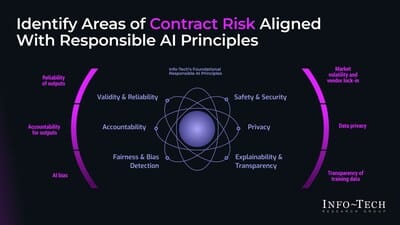In the face of rapidly growing demand for artificial intelligence (AI) solutions across diverse industries, negotiating generative AI vendor contracts expertly is vital for strategic business operations. Info-Tech Research Group has recently published a research paper, “Prepare to Negotiate Your Generative AI Vendor Contract”. This aims to endow IT teams and their organizations with the essential strategies needed for these negotiations, thus also shedding light on the inherent risks involved in Gen AI agreements and their potential organizational impact.
The Growing Importance of AI Contract Negotiation
The introduction of Gen AI into the business world has seen many organizations eager to leverage this technology. They value its potential in various applications, such as data analysis and summary, copywriting, image generation, and code writing. Although excitement surrounds the possibilities these tools offer, it is crucial that IT leaders remain keenly aware of the potential risks involved and fully understand what to consider when entering AI vendor contract negotiations.
The Challenges and Risks of Implementing AI Tools
Cutting-edge AI tools do not come without their challenges. In situations where AI tools are applied without clear boundaries or guidelines set by IT, legal and data safety concerns may arise. Many organizations are uncertain about the safety of their data within generative AI tools. Therefore, IT leaders need to address these concerns to ensure their organizations maintain a competitive edge in the current business market.
Six Guiding Principles for AI Implementation
Info-Tech’s research outlines six guiding principles that IT leaders should mull over while assessing and implementing AI:
- Safety & Security: The system must be secure, safe, and robust.
- Privacy: Individual data privacy must be respected.
- Explainability & Transparency: Decisions or predictions should be explainable.
- Fairness & Bias Detection: Data used must be unbiased to produce predictions that are fair.
- Accountability: A person or organization must take responsibility for any decisions made based on the AI model.
- Validity & Reliability: Monitoring of the data and the model needs to be planned.
In conclusion, IT leaders play a critical role in setting the responsible AI principles. With careful understanding of AI capabilities, opportunities, and risks, organizations can negotiate effectively with providers. Following Info-Tech’s guiding principles provides a framework to safeguard both technical and non-technical staff when working with AI technologies, balancing innovative potential and risk management.
Don’t miss our latest Startup News: Amplica Labs Transforms Digital Dialogue with Speakeasy Acquisition
